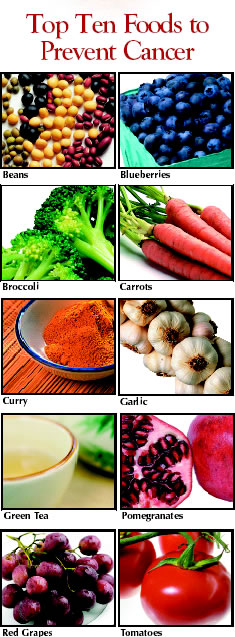Nutrition & Cancer:Myths, Controversies & Realities
 There is a wealth of research available today on the effect of diet and nutrition on physical health. In general, it is believed that a balance of healthful foods combined with regular physical activity decreases life-long cancer risk as well as contributes to overall good health. After a diagnosis of cancer, some people experience weight gain, while others are unable to stop losing weight. It is important for all cancer patients to maintain a healthy weight by staying active and balancing energy needs with a healthful diet. Your doctor can refer you to an experienced nutritionist who is part of your overall health care team. Below is a typical meal plan for someone who is battling cancer.
There is a wealth of research available today on the effect of diet and nutrition on physical health. In general, it is believed that a balance of healthful foods combined with regular physical activity decreases life-long cancer risk as well as contributes to overall good health. After a diagnosis of cancer, some people experience weight gain, while others are unable to stop losing weight. It is important for all cancer patients to maintain a healthy weight by staying active and balancing energy needs with a healthful diet. Your doctor can refer you to an experienced nutritionist who is part of your overall health care team. Below is a typical meal plan for someone who is battling cancer.
Plant Power
No one knows exactly which combination of vitamins and nutrients is most effective at reducing cancer risk, but we do know that nutritional supplements don’t offer the same protection as real fruits, vegetables and whole grains.
These foods are loaded with cancer fighting nutrients and antioxidants and should form the base of every meal.
Populations who consume at least five servings of produce daily have a lower incidence of gastrointestinal, respiratory tract and cervical cancers. Choose darkly pigmented, aromatic vegetables, fruits and culinary herbs to increase the amount of antioxidants and bioflavonoids in your diet. Drink a cup or two of green tea each day for bioflavonoids that are associated with a reduced risk of cancer.
Cut the Animal Fat
Obesity and high fat diets have been associated with increased incidences of breast, endometrial, cervical and ovarian cancer in women, and colon, rectal and prostate cancer in men. The American Cancer Society recommends choosing lean cuts of meat and low or non-fat dairy products, as well as fish, nuts and seeds as sources of healthful oils. Olive oil, peanuts and avocado are sources of beneficial mono-unsaturated fat.
Step it Up
Many people aren’t aware of how important exercise is for cancer patients. Staying active during treatment can make a huge difference in overall wellbeing and self-confidence, and can reduce insomnia. Physical activity doesn’t have to be strenuous to be beneficial. A morning walk, some gardening and an evening walk are just as valuable as a workout at the gym and easily attainable.
Alcohol
Some evidence suggests that alcohol consumption raises the risk of breast cancer in susceptible women. What is also known, however, is that a small amount (one drink for a woman and two for a man) of alcohol, particularly red wine, may be protective against heart disease. Some advocates suggest that the benefits may outweigh the risk. The American Cancer Society advises people to limit consumption, and if you or your family have a history of breast cancer, to avoid alcohol altogether.




















